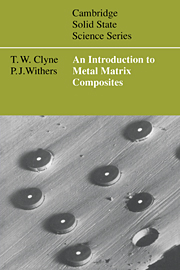Book contents
- Frontmatter
- Contents
- Preface
- 1 General introduction
- 2 Basic composite mechanics
- 3 The Eshelby approach to modelling composites
- 4 Plastic deformation
- 5 Thermal effects and high temperature behaviour
- 6 The interfacial region
- 7 Fracture processes and failure mechanisms
- 8 Transport properties and environmental performance
- 9 Fabrication processes
- 10 Development of matrix microstructure
- 11 Testing and characterisation techniques
- 12 Applications
- Appendix I Nomenclature
- Appendix II Matrices and reinforcements – selected thermophysical properties
- Appendix III The basic Eshelby S tensors
- Appendix IV Listing of a program for an Eshelby calculation
- Author index
- Subject index
8 - Transport properties and environmental performance
Published online by Cambridge University Press: 04 February 2010
- Frontmatter
- Contents
- Preface
- 1 General introduction
- 2 Basic composite mechanics
- 3 The Eshelby approach to modelling composites
- 4 Plastic deformation
- 5 Thermal effects and high temperature behaviour
- 6 The interfacial region
- 7 Fracture processes and failure mechanisms
- 8 Transport properties and environmental performance
- 9 Fabrication processes
- 10 Development of matrix microstructure
- 11 Testing and characterisation techniques
- 12 Applications
- Appendix I Nomenclature
- Appendix II Matrices and reinforcements – selected thermophysical properties
- Appendix III The basic Eshelby S tensors
- Appendix IV Listing of a program for an Eshelby calculation
- Author index
- Subject index
Summary
The previous four chapters have covered the basic deformation and failure behaviour of MMCs under an applied load, including the effects of testing temperature and loading rate. There are, however, other aspects of their performance which are often of considerable importance. For example, MMCs offer scope for high electrical and/or thermal conductivity in combination with good mechanical strength. Good thermal shock resistance, particularly when compared with many competing ceramic-based materials, might thus be expected. Surface properties, and the degradations that might occur in abrasive, corrosive or other aggressive environments, may also be important issues in a wider range of applications. These topics are complex and wide-ranging, but the treatments in this chapter are aimed simply at identifying the ways in which the responses of MMCs in various special situations differ from those of other, more conventional materials.
Thermal and electrical conduction
There are many applications in which the high electrical and/or thermal conductivities of metals are exploited. A problem commonly arises in situations where this needs to be combined with good mechanical properties, in that conventional strengthening by alloying leads to sharp reductions in these conductivities.
- Type
- Chapter
- Information
- An Introduction to Metal Matrix Composites , pp. 277 - 317Publisher: Cambridge University PressPrint publication year: 1993

